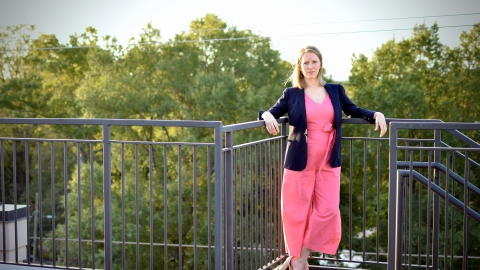
Brianna Clarke-Schwelm ’11, Religious Studies
January 8, 2021
Brianna Clarke-Schwelm '11 detailed her experiences working to improve health care access and the social status of women in a TEDx talk on women's rights in Spring 2020. Photo by Sebastian Schwelm
At 18, you don’t know what you want to do, but you know you want to make an impact. Discovering how I would do that while studying abroad was the biggest gift Bucknell gave me.
Arriving at Bucknell, Brianna Clarke-Schwelm '11 knew one thing for certain: she wanted to change the world. And it wasn't long before a pivotal study-abroad experience gave the religious studies major her first chance to make a global impact.
For three months on Rusinga Island in Western Kenya during her junior year, Clarke-Schwelm helped local leaders secure funding for a health clinic to battle the HIV epidemic. Not only did she observe the social stigma against HIV-positive people that disproportionately disadvantaged women, but she also saw the impact that strong community leaders can have on addressing inequities.
So after graduating, Clarke-Schwelm went to work empowering communities across the globe to improve health care access, with a keen interest in elevating the social status of women. Serving in public-health clinics in Honduras, Panama and Kenya for nearly a decade, she says, "really amplified those intrinsic links between education, politics and health."
"Women can't get jobs, run for office or be leaders in their communities if they're sick or caring for people who are sick," explains Clarke-Schwelm, who detailed her experiences in a TEDx talk on women's rights in spring 2020. "We have to address public health if we want the most marginalized people on this planet to have a shot at not only gaining equality but also pursuing the lives they want to live."
After earning a master of public health degree from Harvard in 2017, the North Carolina native began working to prevent interpersonal violence in the United States. As the director of prevention for InterAct, a domestic and sexual violence service organization in her home state, Clarke-Schwelm provides tools for children and adults to model healthy relationships in their lives and families.
Her current work is infused with the same spirit of empowerment that she discovered on Rusinga Island, where community leaders continue to launch women's rights and public-health projects, with Clarke-Schwelm continuing to consult with them remotely.
"Local communities are fully capable of being the change-makers themselves, because they have the brilliance and the culturally appropriate solutions for the challenges that they face in this world," Clarke-Schwelm says. "I'm so inspired by that, and it's exactly why I do the work that I do."
